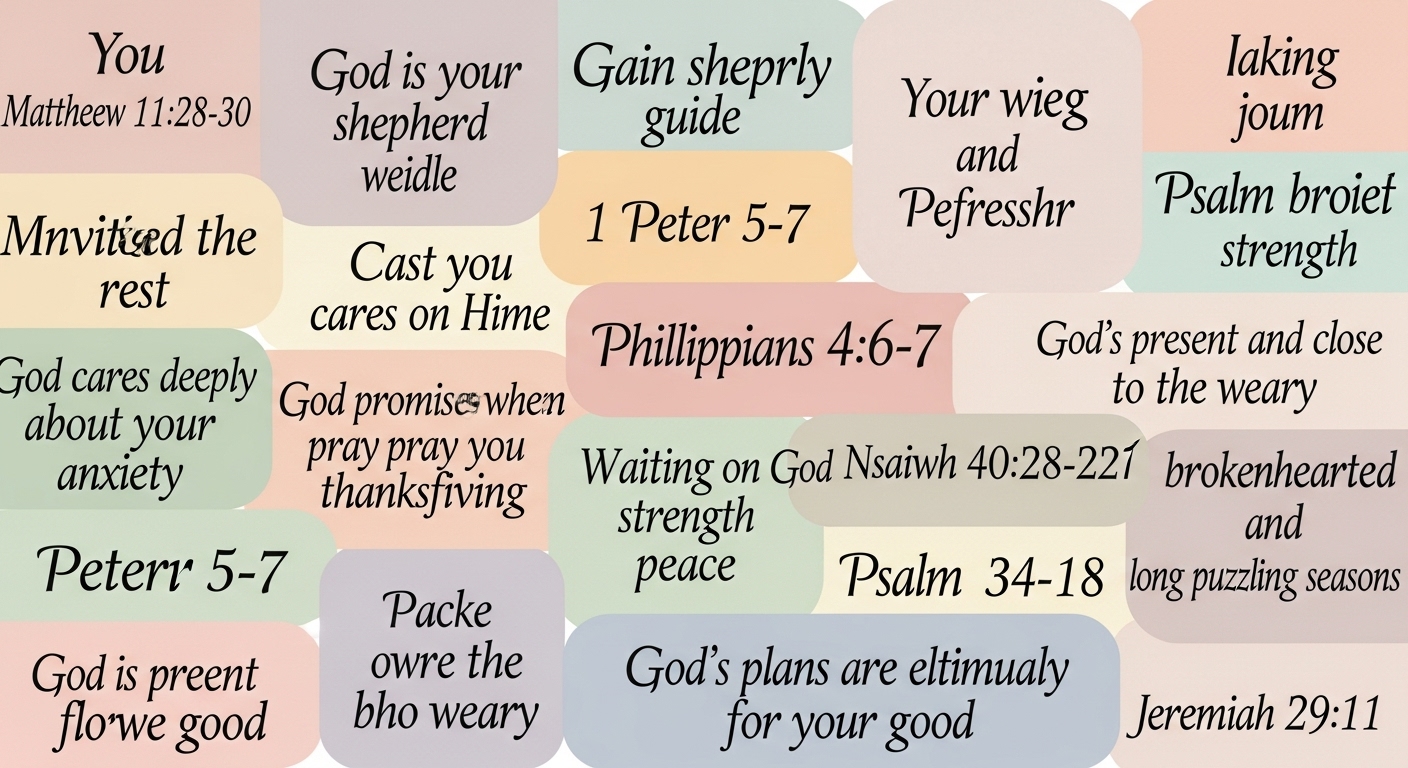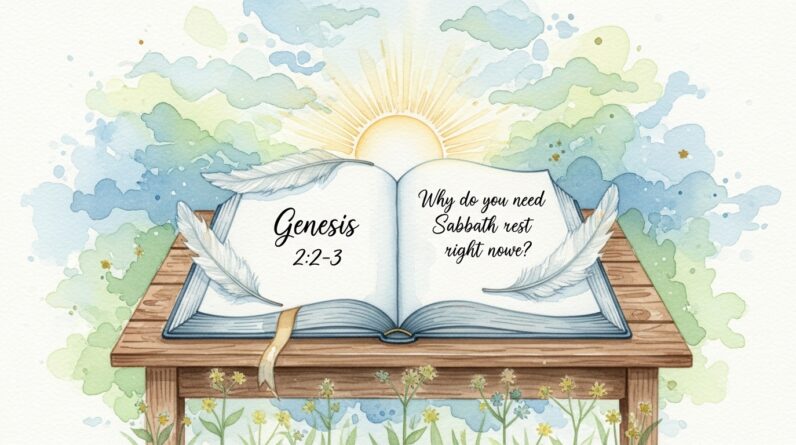Finding Rest In God’s Promises When Life Feels Heavy

You’re reading this because life is heavy right now. Maybe the weight is obvious—loss, illness, financial strain—or maybe it’s the quieter, persistent pressure of anxiety, exhaustion, or unmet expectations. Either way, you’re longing for something solid to hold onto. That longing is actually an invitation: an invitation toward finding rest in God. In this article, you’ll find practical devotional guidance, Scripture-centered encouragement, and simple spiritual practices to help you experience God’s strength, comfort, and emotional relief when you need them most.
Below, you’ll see Scripture references linked to Bible Gateway for easy reading and further study. You’ll also find suggested AI image prompts and placements to visually support each part of the devotional. This is intended to be both a heart-level and a habit-level guide—something you can read slowly, return to, and put into practice.
Why you need to hear about finding rest in God right now
You might be tempted to think rest is a luxury reserved for when everything’s ‘fixed.’ But the truth is, rest is a spiritual resource provided to you in the middle of struggle. When life feels heavy, rest isn’t a reward for getting things right; it’s a refuge God extends to you so you can keep going without being crushed by the load. The biblical invitation toward rest is open to you regardless of your performance, and it’s meant to change the way you handle pressure, not just give you a temporary break.
The idea of finding rest in God shows up again and again in Scripture. Jesus invites the weary to come to him for rest (Matthew 11:28-30). The psalmists speak of God as shepherd and shelter, leading the exhausted beside still waters (Psalm 23:1-3). Those promises are not theoretical: they’re practical pathways for your emotions and your rhythm of life.
What “rest” actually means in a spiritual sense
When you think of rest, you might picture sleep, vacation, or doing nothing. Spiritual rest overlaps with those ideas but goes deeper. It’s a state where you stop striving to control outcomes, and you trust God’s presence, provision, and power. Spiritual rest includes:
- an inner peace that holds when circumstances are unstable,
- an emotional slowing that helps you make wiser decisions,
- a spiritual confidence that you are held even when life hurts.
This rest is tied to the promises God gives. It’s not about ignoring responsibilities; it’s about reorienting how you carry them. Instead of trying to manufacture strength from your own reserves, you learn to rely on God’s promises and presence so you don’t burn out.
The biblical foundation for finding rest in God

The Bible repeatedly points you toward rest as part of your spiritual life. Here are a few key passages to anchor your heart:
- Jesus’ personal invitation to the exhausted: Matthew 11:28-30.
- The Shepherd who guides and refreshes you: Psalm 23:1-3.
- An encouragement to trust and be still: Psalm 46:10.
- A call to cast your anxieties on God because He cares: 1 Peter 5:7.
- The promise of strength when you wait on the Lord: Isaiah 40:28-31.
- An assurance of God’s plans for you, even amid uncertainty: Jeremiah 29:11.
These texts don’t just tell you what rest is; they show you where rest comes from—God’s character, His presence, and His promises.
Why you’re still carrying the weight (and how to notice it)
You don’t have to be doing something dramatic to be carrying a heavy load. Small, repeated stresses—unfinished tasks, worry about relationships, the pressure to perform, or unresolved grief—pile up and become a chronic burden. Recognizing that you’re carrying weight is the first step toward finding rest in God. Signs you’re carrying more than you should include chronic irritability, constant fatigue, difficulty focusing, lost enjoyment in regular pleasures, and avoidance behaviors like sleeping more to escape.
Admitting you’re tired isn’t failure. It’s the honest starting point for a spiritual practice. When you name the heaviness, you can begin to present it to God—an act central to finding rest in God. Scripture encourages honesty with God; you can bring the rawness of your feelings to Him and trust that He meets you in the mess.
Practical devotional practice: a simple model you can use daily
Devotional rhythms can feel overwhelming when you’re exhausted, so start simple. Try a three-part practice: Pause, Pray, and Promise.
Pause: Take a minute to stop what you’re doing. Breathe slowly, and let your body settle. The goal is to create space to be aware of God’s presence instead of being driven by urgent tasks.
Pray: Use a short breath prayer or a simple sentence prayer. For example, “Lord, help me rest” or “Jesus, I bring this anxiety to you.” A breath prayer helps you return to God throughout the day without needing long, uninterrupted time.
Promise: Read one short verse that reminds you of God’s faithfulness and repeat it aloud. Verses like Philippians 4:6-7 and 1 Peter 5:7 are helpful because they directly speak to worry and God’s care.
This practice doesn’t replace extended spiritual disciplines, but it gives you an accessible way to begin experiencing rest even in crowded seasons.
Anchoring promises to claim when life feels heavy

Words matter. When life feels heavy, you can claim specific promises from Scripture to steady your heart. Here are several promises you can tuck into your prayers and mind:
- You are invited to rest: Matthew 11:28-30 promises rest for the weary.
- God is your shepherd and guide: Psalm 23:1-3 assures guidance and refreshment.
- God cares deeply about your anxiety: 1 Peter 5:7 invites you to cast your cares on Him.
- God promises peace when you pray with thanksgiving: Philippians 4:6-7 connects prayer with peace.
- Waiting on God renews strength: Isaiah 40:28-31 speaks to renewed strength for the weary.
- God is present and close to the brokenhearted: Psalm 34:17-18 offers comfort for grief.
- God’s plans are ultimately for your good: Jeremiah 29:11 gives perspective in long, puzzling seasons.
As you memorize or meditate on these promises, you’ll notice an internal shift: the burden feels less like your own personal engine to run and more like something you can hand off and carry with God’s help.
How to make these promises practical in ordinary moments
It’s one thing to know a promise intellectually; it’s another to experience it in a crisis or a stressful meeting. To make promises practical, create tiny rituals that remind you of God’s truth throughout the day. Examples include:
- A short bookmark with one verse you can read where you eat or work.
- Setting a gentle phone alarm that chimes with a short prayer or verse to interrupt busy thoughts.
- Write a single promise on a sticky note and place it on a mirror to read while you brush your teeth.
The repetition of these small acts trains your heart to shift toward God’s promises even when stress tries to dominate your thinking. Over time, these rituals cultivate a default posture of leaning on God—an essential aspect of finding rest in God.
Practical spiritual tools: Sabbath, silence, and sacred rhythms
You don’t have to overhaul your schedule to practice sacred rhythms. Sabbath, silence, and other rhythms can be adjusted to your life stage and responsibilities. Sabbath is less about a rigid day and more about practicing trust: choosing to stop working in ways that assume you alone keep everything going. Silence and solitude help you hear God beneath the noise of your life.
Begin small: designate a short weekly block of time for rest—an afternoon, a morning, or even an evening—where you intentionally disengage from work and screens. During that time, read a short Scripture passage (e.g., Psalm 46), take a slow walk, or simply sit quietly and breathe while inviting God’s presence.
These practices help you experience the reality behind the promises—God’s nearness and sufficiency—so that finding rest in God becomes more than a hope; it becomes a lived experience.
When you don’t feel God’s presence: what to do?

There will be days when God’s presence feels distant, even when you’re trying. That’s normal. Spiritual dryness doesn’t mean God has abandoned you; it often means God is working in ways you don’t perceive or is giving you space to learn to trust Him beyond feelings.
When you don’t feel God, continue small faithful practices: speak honestly to God about your feelings, continue reading short Scriptures, and practice acts of service or gratitude. Remember the promise of Psalm 62:5-8 which calls you to trust quietly and rest in God alone. Over time, faithful practice shapes faith beyond emotion and positions you to receive God’s comfort even in dry seasons.
How to handle doubt, anger, and grief while seeking rest
Your emotions—doubt, anger, grief—are honest responses to pain. Don’t silence them in the name of ‘rest.’ Spiritual rest includes the freedom to bring messy feelings to God. The Psalms model this for you: David and other psalmists pour out anger, fear, and sorrow while still addressing God as Lord. You can do the same. Express your questions, confess your confusion, and cry out with honesty.
Here are practical steps:
- Name the emotion specifically. Don’t say “I feel bad.” Say “I feel angry” or “I feel empty.”
- Journal directly to God. Use first-person language, and don’t censor.
- Use Scripture to frame your feelings, not to dismiss them—Psalm 34 and Psalm 42 are good places to start.
- Seek trusted friends or a pastor who can hold space for your honesty.
By bringing your raw emotions to God, you’re not rejecting faith—you’re practicing it. This honest engagement is part of finding rest in God because it invites God into the full landscape of your experience.
Community and confession: you don’t have to bear this alone
Rest is often communal. God uses relationships—friends, small groups, mentors—to remind you of His promises and to help carry the load. Confession, not as a one-time event but as a habit of sharing what burdens you, lightens the load and creates accountability.
If you’re hesitant to share, start with one trusted person and say, “I’m carrying a heavy load; can I be honest with you?” Let them pray with you and help you figure out practical next steps. Being known in this way is restorative and is a tangible outworking of the command to love one another.
Short prayers and breath practices you can use right now
When you need immediate relief, short prayers can reorient your heart in seconds. Here are a few you can use:
- Breath prayer: Inhale slowly while thinking “Lord, I come,” exhale slowly while thinking “Give me rest.”
- Quick surrender: “God, I hand this worry to you now. I trust you with it.”
- Gratitude anchor: “Thank you, God, for one thing you did today,” and name it out loud.
These practices interrupt the cycle of worry and create small windows where you can experience the presence that supports finding rest in God.
Journaling prompts for a 7-day devotional to experience rest
If you want a short devotional plan, try these prompts for a week. Spend 5–10 minutes each day responding.
Day 1: Read Matthew 11:28-30. Journal where you feel weary and hand that to Jesus.
Day 2: Read Psalm 23:1-3. Reflect on where you need guidance and refreshment.
Day 3: Read Philippians 4:6-7. Write a brief prayer of gratitude and concern, then pause and breathe.
Day 4: Read Isaiah 40:28-31. Note where you feel weary; ask God to renew your strength.
Day 5: Read Psalm 46:10. Practice stillness for five minutes and listen.
Day 6: Read 1 Peter 5:7. Cast one specific anxiety to God in writing.
Day 7: Read Psalm 34:17-18. Reflect on God’s closeness in pain and write a short letter to God about what you’ve learned.
This plan isn’t a magic fix, but regular engagement with Scripture and honest prayer reshapes your inner landscape and helps you practice finding rest in God.
How to create an “emergency” rest plan for crisis moments
When a crisis hits, you need a compact plan you can use immediately. Here’s a simple emergency rest plan you can keep on your phone or in your wallet:
- Step 1: Stop whatever you’re doing for one minute. Focus on breathing.
- Step 2: Say a one-sentence prayer: “God, I need you right now.”
- Step 3: Read one short verse—carry a digital bookmark for Matthew 11:28 or Philippians 4:6.
- Step 4: Call or text a trusted person with a pre-written message: “Can you pray for me? I’m hurting.”
- Step 5: Do a simple physical reset—walk for five minutes, splash water on your face, or sit and breathe.
An emergency rest plan gives you a routine to break the spiral of panic and to move toward finding rest in God even in urgent moments.
The long game: building habits that sustain rest
Short practices help in a pinch, but building a life oriented around rest requires habits. These aren’t about adding religious chores; they’re about creating rhythms that keep you rooted in God. Consider the following habits:
- Regular times of silence and Scripture reading.
- A weekly rhythm of rest (Sabbath), even if it’s limited.
- A spiritual buddy or accountability partner who checks in.
- A practice of gratitude—three things each day.
Over months and years, these habits reduce your baseline anxiety and help you enter rest more naturally. They position you for resilience, so heavy seasons drain you less and reveal God’s sustaining grace more.
Stories of rest: simple examples that might mirror your life
You don’t need a dramatic testimony to benefit from finding rest in God. Imagine:
- A young parent who decides to pray a single breath prayer during diaper changes and notices decreased frustration.
- A nurse who reads one psalm at the start of each shift finds steadier compassion.
- A college student who trades one evening of scrolling for a short walk and breath prayer and sleeps better as a result.
These everyday stories show how paging God into ordinary moments compounds into real change. The small, faithful steps are often enough to keep you moving toward rest.
When rest means changing your context
Sometimes rest requires practical changes: boundaries with work, saying no more often, or seeking professional help for mental health. Finding rest in God doesn’t mean you ignore these realities; it means you integrate spiritual trust with wise, practical choices. If you’re overwhelmed long-term, consider counseling, medical evaluation, or practical support like financial counseling. God’s rest is not opposed to medical or practical wisdom—it often works alongside professional help and wise community.
Encouragement to keep going when progress feels slow
You’ll have days when rest feels elusive. That’s okay. Progress in spiritual practices is rarely linear. Keep returning to small practices, and be gentle with yourself if you relapse into frantic patterns. Remember the promise of Hebrews 4:9-11, which speaks of entering God’s rest through faith and surrender. Your persistence matters, but not because you must achieve perfect stillness—because each return to God rewires your heart toward reliance and peace.
Final reflections: living with the promise of rest
Finding rest in God isn’t a one-time event; it’s a way of living. It changes how you interpret stress, how you prioritize rest and work, and how you relate to God in every moment. The biblical picture is consistent: God invites you, meets you, strengthens you, and gives you peace as you come. As you practice small rhythms of pausing, praying, and claiming God’s promises, you’ll find that life’s heaviness doesn’t disappear overnight—but you’ll begin to carry it differently, with God’s presence as your primary support.
Take one practical step today: choose one short promise and tuck it into your phone or mirror. Return to it every time you feel strain. Over time, that simple anchor will help you live into the reality of finding rest in God.

Explore More
For further reading and encouragement, check out these posts:
👉 7 Bible Verses About Faith in Hard Times
👉 Job’s Faith: What We Can Learn From His Trials
👉 How To Trust God When Everything Falls Apart
👉 Why God Allows Suffering – A Biblical Perspective
👉 Faith Over Fear: How To Stand Strong In Uncertain Seasons
👉 How To Encourage Someone Struggling With Their Faith
👉 5 Prayers for Strength When You’re Feeling Weak

📘 Jesus and the Woman Caught in Adultery – Grace and Mercy Over Judgement
A powerful retelling of John 8:1-11. This book brings to life the depth of forgiveness, mercy, and God’s unwavering love.
👉 Check it now on Amazon 🛒💥
🔥 “Every great message deserves a home online.” 🌍💬🏡
Don’t let your calling stay hidden. Start a Christian blog or website using Hostinger — with 99.9% uptime, a free domain, and SSL, your voice can shine for God’s glory anytime, anywhere.
💥 Begin today. 🛒 Try it RISK-FREE! ✅
✝️ “Your body is God’s temple — care for it with purpose.” 💪💖🏛️
Renew your energy and restore balance naturally. Mitolyn helps support a healthy metabolism, giving you the vitality to live out God’s calling with strength and confidence.
🔥 Unlock Your Metabolic Power! ⚡Burn More Calories & Feel Great With Mitolyn. 💪
👉 Start Today. 🚀 Check Price Now. 🛒💰
💰 As a ClickBank & Amazon Affiliate, I earn from qualifying purchases.
📖 Acknowledgment: All Bible verses referenced in this article were accessed via Bible Gateway (or Bible Hub).
🚀 Want to explore more? 👉 Dive into our new post on Why Jesus? and experience the 🔥 life-changing truth of the Gospel!







